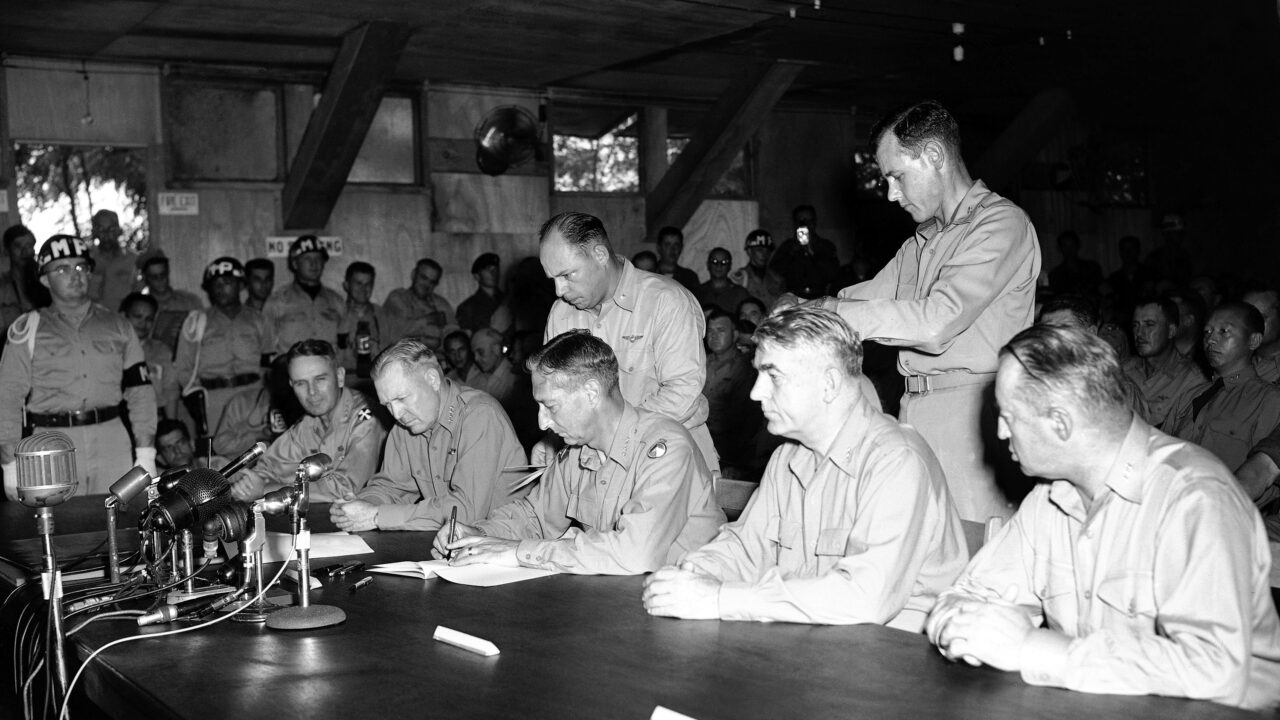It’s Time To End the Forever War on the Korean Peninsula
On the 70th anniversary of the armistice, a new call for a peace treaty between Washington and Pyongyang. Commander-in-chief, United Nations Command, and U.S. Army Gen. Mark W. Clark signs the Military Armistice agreement at a base camp at Munsan-ni, Korea on July 30, 1953. (AP Photo/CIH)
Commander-in-chief, United Nations Command, and U.S. Army Gen. Mark W. Clark signs the Military Armistice agreement at a base camp at Munsan-ni, Korea on July 30, 1953. (AP Photo/CIH)
This article is part of Responsible Statecraft’s weeklong series commemorating the 70th Anniversary of the Korean War armistice, July 27, 1953.
When talking about “war” in the year 2023, most people will immediately think of Ukraine and then possibly mention Syria, Yemen, Myanmar, or Afghanistan. Very few people would think of Korea first when the word “war” is mentioned, let alone when talking about a “forever war,” a term many, including current U.S. President Joe Biden, use to describe the war in Afghanistan.
The war on the Korean Peninsula, however, has been ongoing for over 70 years. Just because there is no active fighting taking place does not mean there is peace. Fighting ceased in 1953, three years after the start of the war, as a result of an Armistice Agreement, not a peace treaty. While signing such a treaty has not been a priority over the last seven decades, the increasingly volatile and risky military situation on the Korean Peninsula can no longer be ignored.
The time to achieve denuclearization through deterrence and unilateral demands has passed.
The Korean War broke out on June 25, 1950 when the North invaded the South in hopes of quickly reunifying the country under Kim Il-sung’s leadership. The North’s plan was foiled, however, when President Truman announced the intervention of the U.S. in the war two days later. The United Nations Command (UNC) was subsequently established on July 7, 1950, which resulted in 22 countries contributing various forms of support to South Korea throughout the war.
With the help of the U.S.-led UNC, the South quickly gained the upper hand and was able to drive North Korean forces back north of the 38th parallel by mid-September. The tide of the war changed again, however, when China sent troops to support North Korea in late November. After a series of back-and-forth wins and losses, fighting stalled around the 38th parallel in May 1951. Peace talks then commenced in July which ultimately resulted in the Armistice Agreement signed on July 27, 1953.
Although the fighting between North and South ended on paper, various provocations and military incidents continued throughout the Cold War period. Some examples include the 1968 Blue House raid when North Korean agents tried to assassinate South Korean President Park Chung-hee; the 1976 Axe Murder Incident when North Korean soldiers killed two US Army officers; the 1983 Rangoon Bombing when North Korean agents attempted to assassinate South Korean President Chun Doo-hwan; and the 1987 bombing of Korean Air Flight 858 by two North Korean agents.
As inter-Korean diplomacy gained momentum in the 1990s, provocations by North Korea started to diminish. This was followed by significant progress towards peace in 2000 when the leaders of the two Koreas met for their first summit.
But despite such progress, North Korean provocations continued and evolved into more threatening actions culminating in its first-ever nuclear test in October 2006. That year marked a pivotal moment in the history of the Korean War. The nation that was once considered significantly inferior to South Korea in almost every aspect had acquired the ultimate means of defense and attack: nuclear weapons.
That the two sides have avoided the resumption of all-out conflict since the Armistice does not mean this grim possibility is non-existent. In fact, the frequency of military provocations has sharply increased over the past year, with the North firing over 90 missiles in 2022 alone. For its part, South Korea’s increasing military cooperation with the United States and Japan, combined with powerful voices in Seoul calling for its own nuclear weapons program, has not helped defuse the situation.
For decades, deterrence efforts have failed to persuade the North to abandon its nuclear and missile programs. The time to achieve denuclearization through deterrence and unilateral demands has passed. The focus must now be placed squarely on arms control and accepting the reality that North Korea has indeed become a nuclear state. Without taking this first basic step, resuming diplomacy—let alone getting to a peace treaty—will be highly difficult.
Once this step is taken, however, regular communication and negotiations can follow. These efforts should also go hand in hand with steps to expand the scope of U.S.-DPRK relations with the goal of normalizing diplomatic ties.
The focus must now be placed squarely on arms control and accepting the reality that North Korea has indeed become a nuclear state.
The reason why the United States is at the center of this issue is because the Armistice Treaty was signed by North Korea, China, and the United States. South Korea never signed the Armistice and, as such, has no official say in whether a peace treaty will be signed or not. The decision ultimately falls to Washington and Pyongyang (China has previously expressed support for ending the Korean War).
Still, this does not mean there is no place for Seoul in this process. One way South Korea can help is to play a facilitating role in improving U.S.-North Korea ties and resuming inter-Korean dialogue to lower tensions, build trust, increase cross-border exchanges, and establish bilateral relations based on a strong foundation. The current Yoon Suk-yeol administration should build on the efforts made by the previous Moon Jae-in government instead of expanding military drills and engaging in repeated tit-for-tat provocations with the North. These provocations could easily lead to accidents and misunderstandings that could trigger the resumption of full-blown war. None of this serves South Korea’s national interests.
With every year that goes by without a peace treaty, North Korea continues the development of ever more advanced nuclear weapons, missiles, and military technology. The resumption of conflict on the peninsula in current times could lead to a catastrophic nuclear war that would affect the entire world, not just Northeast Asia. The United States can no longer afford to be distracted by other global issues, as pressing as they may be.
The situation on the peninsula demands resolution, and the only way to ensure lasting peace is by ending the Korean War and signing a peace treaty.
Your support matters…Independent journalism is under threat and overshadowed by heavily funded mainstream media.
You can help level the playing field. Become a member.
Your tax-deductible contribution keeps us digging beneath the headlines to give you thought-provoking, investigative reporting and analysis that unearths what's really happening- without compromise.
Give today to support our courageous, independent journalists.






You need to be a supporter to comment.
There are currently no responses to this article.
Be the first to respond.